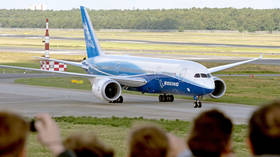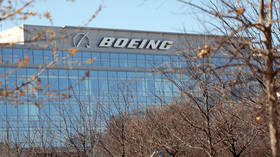Boeing blaming production woes on Russia sanctions – WSJ

Boeing is experiencing problems with the production of its 787 Dreamliner wide-body airliners due to the lack of a key component caused by US sanctions on Russia, the Wall Street Journal has reported.
Heat exchangers, which are used in the plane’s environmental control system and also regulate the temperature of its electronics, had been made by a joint venture between American company RTX’s Collins Aerospace and Moscow-based firm HS-Nauka, the outlet said in an article on Friday.
However, in March 2022, just weeks after the fighting between Russia and Ukraine broke out, the joint venture was shut down as part of restrictions against Moscow over the conflict, the report said.
The manufacturing of temperature-regulating parts was moved to RTX’s new factory lines in the US and UK. They were initially able to keep up with Boeing’s demands due to the company making relatively few planes at the time. But there is now a shortage of heat exchangers, as the US plane-maker is trying to increase the production of Dreamliners, according to the WSJ.
"When the invasion happened, it got moved, and the capacity of that supplier has not kept pace with us,” Boeing’s Chief Executive Dave Calhoun said in April.
Last week, Boeing told investors that due to the lack of heat exchangers and a shortage of cabin seating – which is another problem faced by the company – it will not be able to deliver as many Dreamliner jets as had been planned this year.
The company said production will slow down in the coming months, but stressed that it expects to return to making five planes per month by the end of 2024. It delivered 13 Dreamliners in the first quarter of this year, the WSJ said.
Monthly production of the Boeing 737 MAX has also fallen to single digits, as the company tries to iron out manufacturing issues after a door plug blew out mid-flight on an Alaska Airlines plane in January, Reuters reported last month.
The 737 MAX has had a history of accidents, including two crashes in 2018 and 2019 that resulted in more than 340 deaths.
Earlier this week, Joshua Dean, a former employee of one of Boeing’s suppliers, who raised the alarm over lax standards in the production of the 737 MAX jet, died following a sudden and severe illness. In March, former Boeing quality manager John Barnett was found dead with a gunshot wound days before he was due to give evidence in a whistleblower lawsuit against the aerospace giant.













